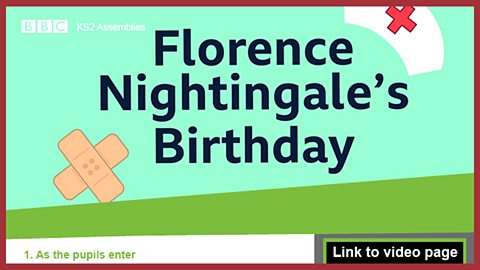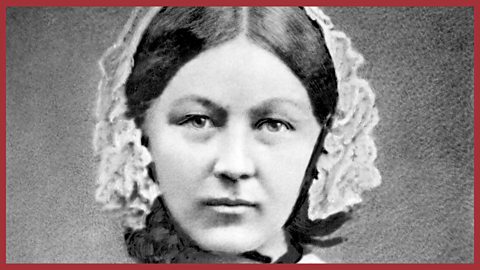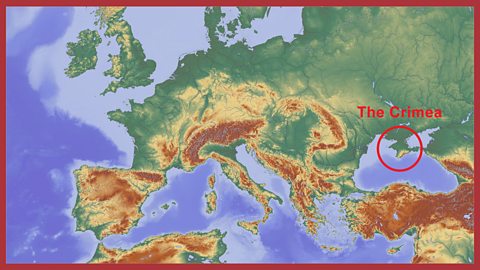In short...
Themes: Florence Nightingaleβs Birthday; International Nurses Day; caring for others; making a difference; significant individuals
Summary: This assembly includes information about Florence Nightingale (1820 - 1910) and reflections about her significance from KS2 pupils. It would be most suitable for use around the time of - 12th May each year - chosen because it is Florence Nightingale's birthday.
- Florence Nightingale was named after the city of her birth - Florence in Italy.
- During the Crimean War (1853 - 1856) her hospital was across the Black Sea in Scutari - part of modern-day Istanbul.
Resources: the ; a map showing in relation to the UK; a photographic in her nursing uniform.

The video
The video begins with a KS2 pupils describing the work her parents do as nurses, how she feels about this and how it impacts their family life. She is then joined by other pupils who respond to a variety of questions and reveal why Nightingale remains an inspiration to them and to others.
The video ends with a short summary of Nightingale's achievements and the information that Nightingale's birthday - 12th May - has since become .
Duration: 3' 48"
Last words: 'β¦inspired to be a nurse when I am older.'
Video questions
During the video the pupils consider the following questions:
- What do nurses do?
- Have you ever been treated by a nurse?
- Why is Florence Nightingale still famous today?
- Where did Florence Nightingale go?
- Why is Florence Nightingale still an inspiration today?

Key links
Download / print the assembly framework ready for use

Click to display the image full-size

Click to display a map showing the location of the UK / Crimea


Suggested framework
1. Entry music
In her book Notes on Nursing Nightingale describes how the aria 'Assia a pie d'un salice' from Otello by Rossini may be used to soothe the sick.
2. Introduction
Ask pupils to think about a time when they might have met or been treated by a nurse. You could show them a picture of a modern-day nurse in uniform. Remind them of the nurses who come in to give them their flu vaccination every year, as well as nurses in their local GP surgery and hospital. Perhaps take a few examples from pupils of times a nurse has looked after them. Show and ask pupils to name her. Explain that you're now going to watch a short video about Florence Nightingale and her importance.
3. The video
Play the video. The duration is 3' 48" and the final words are: 'β¦inspired to be a nurse when I am older.'
4. After the video
Ask the children to spend a few moments thinking about Florence Nightingale and all the people she helped. You could go back over the key events in her life using the ΒιΆΉΤΌΕΔ Bitesize video in the link below.
5. Time to talk
Ask: How did Florence Nightingale make a difference? Try to draw out that not only did she make a difference to the soldiers that she treated, but she also made a difference to us because she was the person who invented modern nursing. Without her we might not have the amazing nurses we have today.
6. Opportunity to sing
. Suggestions from ΒιΆΉΤΌΕΔ collections below.
7. Opportunity to reflect
Ask the children to close their eyes and imagine Florence Nightingale working hard in the hospital in Scutari. She must have found it very difficult but she didnβt give up because she knew how important it was to help the soldiers, and she knew she was making a difference to those soldiers. How can we make a difference in our lives? Who could we help?
8. Opportunity for prayer
Dear God,
Thank you for all those people who care for us when we are sick.
Thank you for people who spend their lives caring for people in hospital.
Help us to find ways to help and care for other people, so that we can make a difference to others like Florence Nightingale did.
Amen.

Suggested songs
Song: 'Give me oil in my lamp' (Come and Praise, no 43. Vocal version)
- Give me oil in my lamp, keep me burning.
Give me oil in my lamp, I pray.
Give me oil in my lamp, keep me burning,
Keep me burning till the break of day.
ChorusSing hosanna, sing hosanna,
Sing hosanna to the King of Kings!
Sing hosanna, sing hosanna,
Sing hosanna to the King!
- Give me joy in my heart, keep me singing.
Give me joy in my heart, I pray.
Give me joy in my heart, keep me singing,
Keep me singing till the break of day.
Chorus
- Give me love in my heart, keep me serving.
Give me love in my heart, I pray.
Give me love in my heart, keep me serving,
Keep me serving till the break of day.
Chorus
- Give me peace in my heart, keep me resting.
Give me peace in my heart, I pray.
Give me peace in my heart, keep me resting,
Keep me resting till the break of day.
Chorus

